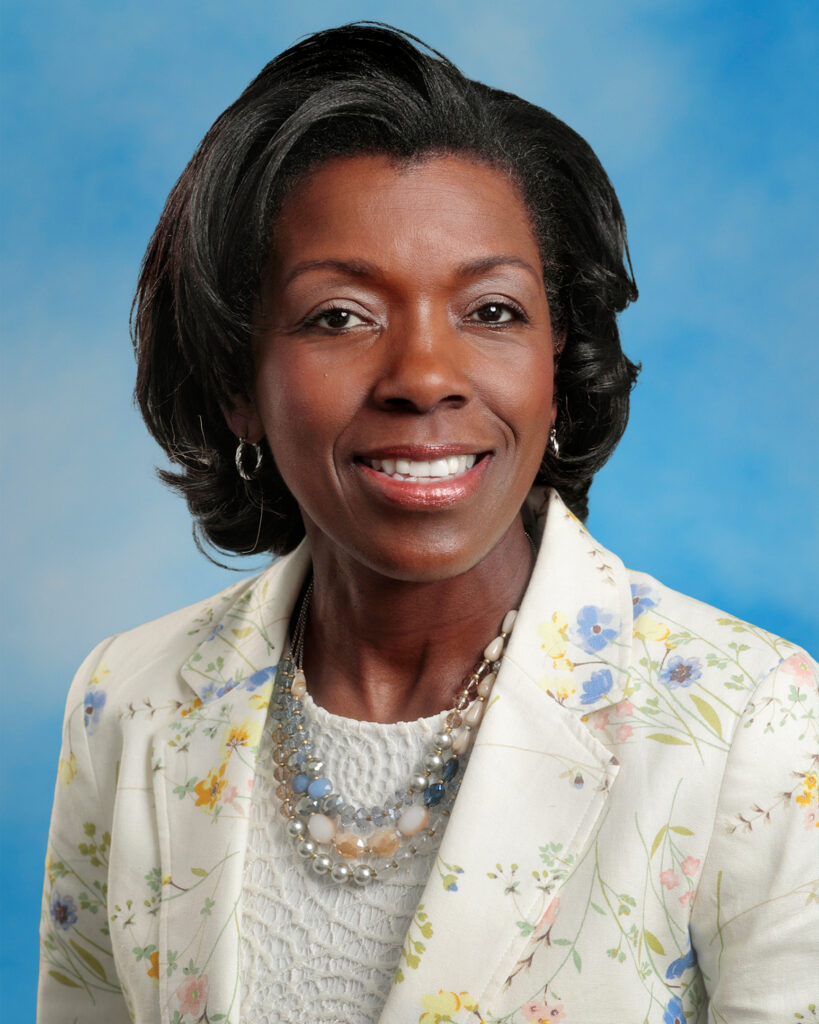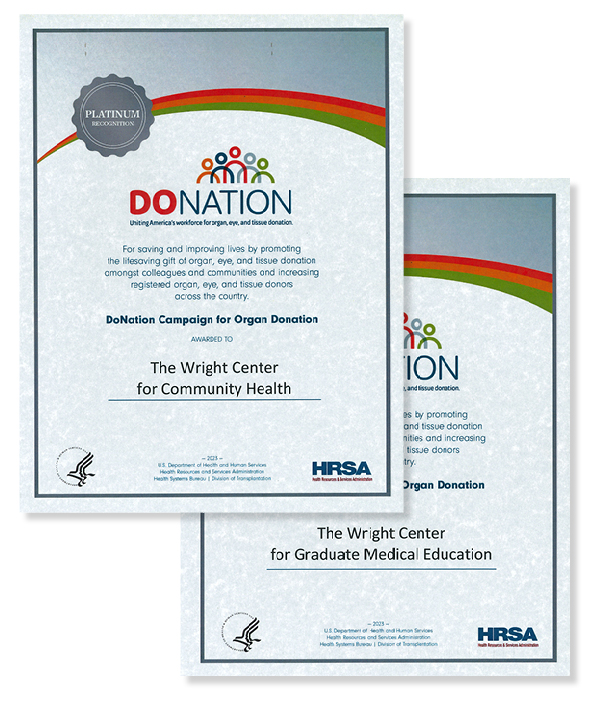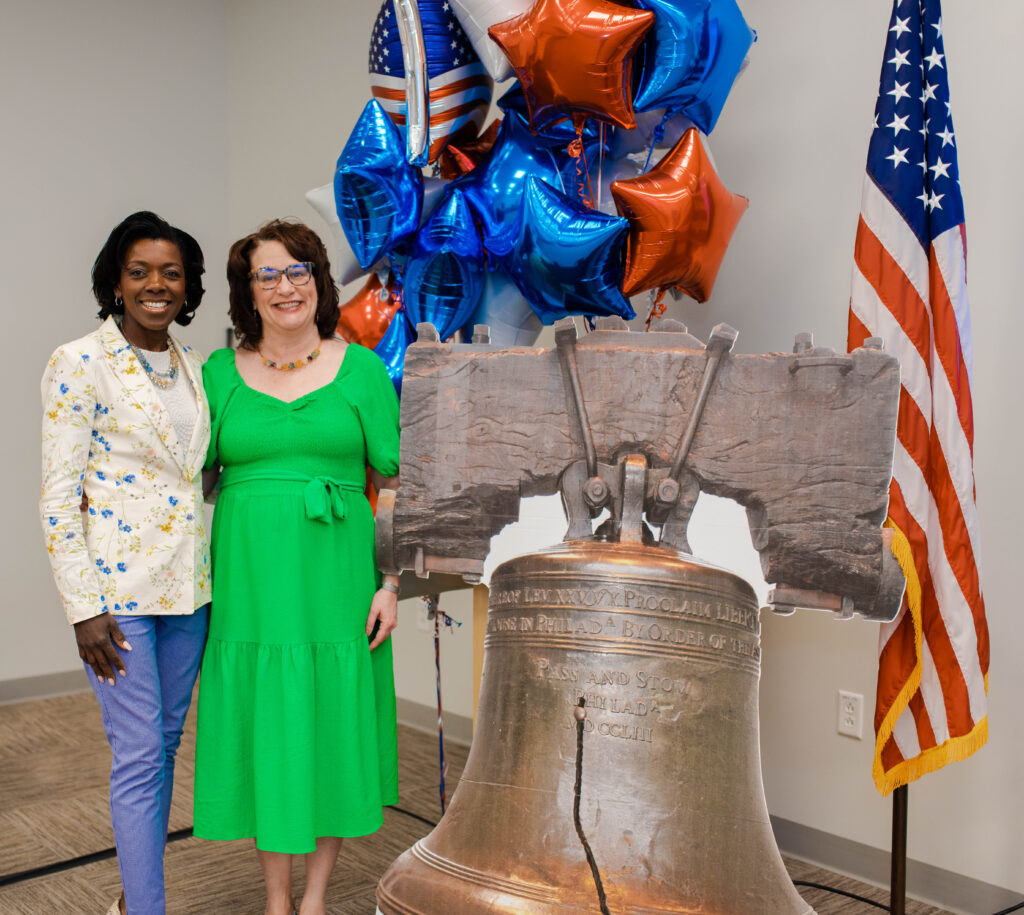Area family blessed by organ donation ŌĆō twice
Peckville resident praises The Wright CenterŌĆÖs clinicians for compassionate care of her husband and son as they faced life-threatening health challenges

Peckville resident Patricia Desouza, who serves on The Wright Center for Community ╗╩╝ę╗¬╚╦ Board of Directors, is an advocate for organ donation, having seen two members of her immediate family develop kidney issues that require transplants.
Faith carried Patricia Desouza and her family through the stressful months of early 2023 when not one but two members of the household were facing kidney failure and needed organ transplants.
As a mother, Patricia Desouza knew instinctively she would volunteer to be a living donor and give one of her kidneys to her oldest son Kenneth. But that meant her husband Larri, a longtime chef, would be compelled to add his name to the national organ transplant waiting list, staking his survival on the kindness of a stranger.
The need for organ donors, including living donors, is constant. More than 103,000 people in the United States are now awaiting an organ transplant, according to the nonprofit United Network for Organ Sharing (UNOS).
UNOS manages the nationŌĆÖs organ transplant system under contract with the federal government. It strives to quickly and fairly match donors with patients awaiting the lifesaving gift of a heart, kidney, liver, lung, or combination of organs.
Although an average of 117 organ transplants are performed daily in this country, people like Larri Desouza sometimes wait months or years for the phone call notifying them a match has been found and their surgery date scheduled. For some, the call never comes. ╗╩╝ę╗¬╚╦ 20 people in the U.S. die each day while waiting for an organ transplant.
In Larri DesouzaŌĆÖs case, he twice received official notice to be ready to report to a Central Pennsylvania transplant hospital, only to later learn someone else on the list was selected to receive the organ. ŌĆ£It got to the point, I think, where my husband lost hope,ŌĆØ says Patricia Desouza of Peckville.
UNOS and its allies, including health care leaders and concerned citizens, have been working to improve the nationŌĆÖs organ donation system. Their aim is to increase organ availability and decrease transplant wait times while also prioritizing equity.
To support this effort, The Wright Center for Community ╗╩╝ę╗¬╚╦ routinely joins with transplant advocates to spread awareness about the issue and spur more people in Northeast Pennsylvania to register as organ, eye, and tissue donors. The Wright Center participates in the ongoing DoNation Campaign as well as National Donor Day (Feb. 14), National Donate Life Month (in April), and Pennsylvania Donor Day (Aug. 1).
ŌĆ£Individuals and families can provide the ultimate gift ŌĆō the gift of life ŌĆō by saying ŌĆśyesŌĆÖ to organ donation,ŌĆØ says Dr. Linda Thomas-Hemak, president and CEO of The Wright Centers for Community ╗╩╝ę╗¬╚╦ and ╗╩╝ę╗¬╚╦ Medical Education. ŌĆ£When you add your name to the donor registry at the time you get or renew your driverŌĆÖs license, or by going to a website such as organdonor.gov, you are expanding the donor pool and potentially answering the prayers of people like Patricia and Larri Desouza and their children.
ŌĆ£It has been a true blessing, honor, and privilege to know, care for, and serve the Desouza family,ŌĆØ says Dr. Thomas-Hemak.
Patricia Desouza, 53, serves as a volunteer director on The Wright Center for Community ╗╩╝ę╗¬╚╦ŌĆÖs Board of Directors. She agreed to publicly share her familyŌĆÖs experience, hoping it might compel even one person to say ŌĆ£yesŌĆØ to donor registration today and possibly change someone elseŌĆÖs tomorrows.

The U.S. ╗╩╝ę╗¬╚╦ Resources and Services Administration presented The Wright Centers for Community ╗╩╝ę╗¬╚╦ and ╗╩╝ę╗¬╚╦ Medical Education with platinum certificates for advocating and participating in the DoNation Campaign for Organ Donation.
ŌĆ£You can be the one,ŌĆØ she says. ŌĆ£You can be the one to give vision to someone who is blind, to give a heart to someone who needs it, to give a kidney to someone who does not have the strength.
ŌĆ£Sometimes in our lives, we take so much for granted, like good health, because a problem is not hitting our house or people who we love,ŌĆØ she adds. ŌĆ£If you see a stranger suffering, however, you feel compassion for them. But, first, you need to see it; you need to hear their story.ŌĆØ
This is the Desouza familyŌĆÖs story.
ŌĆśA burden liftedŌĆÖ
For much of his life, Kenneth Desouza, 25, has been dealing with health challenges and defying the odds. Around age 12, he was diagnosed with Type 1 diabetes, also known as juvenile diabetes. By his late teens, he had developed what the family later learned is nephrotic syndrome, a kidney disorder that results in excess fluid retention and weight gain. He quickly put on 40 pounds, his mother says.
During that time, Kenneth Desouza was in and out of area hospitals for about a year as the family tried to get a proper diagnosis and treatment plan. Finally, while Patricia Desouza, the owner of a cleaning company, was at work one day, she mentioned to a client that she was looking for a top-notch internal medicine doctor. The client and her husband almost immediately put her in touch with The Wright Center for Community ╗╩╝ę╗¬╚╦, even helping to arrange an appointment for the next day.

Patricia Desouza, left, credits Dr. Linda Thomas-Hemak, president and CEO of The Wright Centers for Community ╗╩╝ę╗¬╚╦ and ╗╩╝ę╗¬╚╦ Medical Education, for providing care and instilling hope that uplifted her oldest son as he coped with life-threatening kidney issues.
ŌĆ£I thought to myself, ŌĆśOK, what doctor is going to see my son at 6 oŌĆÖclock on a Friday?ŌĆÖŌĆØ she recalls. ŌĆ£But then in came Dr. Linda Thomas-Hemak.ŌĆØ
During the appointment, Dr. Thomas-Hemak, the president and CEO of The Wright Centers for Community ╗╩╝ę╗¬╚╦ and ╗╩╝ę╗¬╚╦ Medical Education, thoroughly explained Kenneth DesouzaŌĆÖs condition, assured him that he could be treated, and, importantly, offered a few words about his lifeŌĆÖs purpose that resonated with the familyŌĆÖs religious beliefs.
ŌĆ£I didnŌĆÖt know the weight I had in my life until that moment,ŌĆØ says Patricia Desouza, ŌĆ£because there was a burden lifted from my shoulders. I could physically feel relief.ŌĆØ
Soon after that initial visit, she and her husband also became patients of The Wright Center for Community ╗╩╝ę╗¬╚╦.
Budding track star?
Husband and father Larri Desouza, it was discovered back then, was also experiencing a decline in his kidney function, likely as the result of long-term use of a gout medication. His kidney no longer properly filtered his blood. He started dialysis and continued with the three-times-a-week treatment for about seven years. It became apparent he would need a kidney transplant.
His spirits sagged. His weight shot up.
Due to his ballooning body mass index (BMI), and the risk of complications it posed, he was told a transplant surgery was out of the question until he dropped pounds. His primary care physician, Dr. Jignesh Sheth, chief ╗╩╝ę╗¬╚╦ officer for The Wright Center for Community ╗╩╝ę╗¬╚╦, recognized the complex factors contributing to Larri DesouzaŌĆÖs weight gain and stood by him as he prepared for gastric bypass surgery.
ŌĆ£Dr. Sheth understood him,ŌĆØ says Patricia Desouza. ŌĆ£Dr. Sheth didnŌĆÖt judge him.ŌĆØ
After weight-loss surgery, Larri Desouza was able to decrease his BMI and join the organ transplant waiting list. There were a few false starts over a span of a few weeks. Then, in early 2023, he finally got the call. A kidney was available. And it was for him.
He traveled to Geisinger Medical Center, Danville, where the transplant team performed a successful operation.
Only months later, Larri Desouza was visiting relatives in Brazil and training to compete in his age category at a track and field competition. For him, it is perhaps a chance to relive his days as a high school athlete. He is finally free from a demanding dialysis schedule. He can plan for the future.
Says Patricia Desouza, ŌĆ£He can dream again.ŌĆØ
Preparing to ŌĆśflyŌĆÖ
This year, the family is focused on Kenneth DesouzaŌĆÖs pending transplant operation. His kidney function seemingly worsened because of a bout with COVID-19, meaning he, too, needed to start on dialysis.
ŌĆ£For a while, I had two people in the house doing dialysis,ŌĆØ says Patricia Desouza. ŌĆ£We went through a lot. But we always believed God was going to carry us through. We are a family that has faith.ŌĆØ
As of late 2023, Kenneth Desouza was awaiting word from a health insurance provider before adding his name to the organ transplant waiting list, according to his mother. If all goes as planned in the next few months, a donor will be identified, and his surgery will be performed at the Hospital of the University of Pennsylvania in Philadelphia.
Patricia Desouza is a suitable match to donate an organ to her son. But it remains to be seen if he will be the recipient of her kidney or if, through a process called a kidney paired donation ŌĆō or kidney exchange ŌĆō multiple living donorsŌĆÖ kidneys will be swapped so each recipient receives the most compatible transplant that offers the highest likelihood of success.
Until then, Kenneth Desouza musters the strength to continue working each week as a manager of a gas station while also contributing to his church, the Peckville Assembly of God. A talented musician, he plays 10 instruments, including piano, drums, and guitar.
ŌĆ£IŌĆÖve told him, ŌĆśI canŌĆÖt wait for you to get the transplant,ŌĆÖŌĆØ says his mother. ŌĆ£ŌĆśBecause if you can do what you are doing while going through dialysis, I can only imagine how much you will fly without it.ŌĆÖŌĆØ
In Patricia DesouzaŌĆÖs mind, organ donation, whether as a living donor or after death, is about sharing the gifts you have been blessed with and allowing others to reach their human potential. She compares it to runners ŌĆ£passing the baton.ŌĆØ
ŌĆ£In some cases, you ran your race; you did your course. Then you gave the opportunity for somebody to run their race and finish their course as well,ŌĆØ she says. ŌĆ£And in the case of living donors, youŌĆÖre running the race together.ŌĆØ
Get more information, or register as an organ donor, by visiting or.
